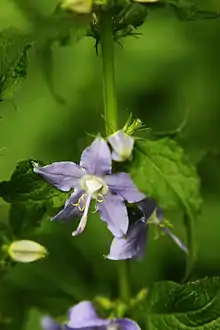Campanula americana
Campanula americana, the American bellflower,[2] is a tall bellflower native to eastern North America from the Great Lakes region south to Florida and from the Dakotas east to New York. This native plant is an annual or biennial from 2-6' tall.[3] Some authorities, including the USDA PLANTS database, consider the name Campanulastrum americanum to be the accepted name for this species.[4][5]
| American bellflower | |
|---|---|
 | |
| Scientific classification | |
| Kingdom: | Plantae |
| Clade: | Tracheophytes |
| Clade: | Angiosperms |
| Clade: | Eudicots |
| Clade: | Asterids |
| Order: | Asterales |
| Family: | Campanulaceae |
| Genus: | Campanula |
| Species: | C. americana |
| Binomial name | |
| Campanula americana | |
| Synonyms[1] | |
|
Synonymy
| |
Its flowers are light blue to violet and are usually arranged in elongated clusters. It is an unusual bellflower in that its flowers are usually flat and not bell-shaped. It has a varying life-history with seeds germinating in the fall producing annual plants and spring-germinating seeds producing biennial plants. It is generally insect-pollinated, and does not usually self-pollinate.[6]
References
- The Plant List, Campanula americana L.
- "Campanula americana". Germplasm Resources Information Network (GRIN). Agricultural Research Service (ARS), United States Department of Agriculture (USDA). Retrieved 2007-10-29.
- "American Bellflower Wildflowers". Archived from the original on 2012-12-23. Retrieved 2012-11-26.
- "PLANTS Profile for Campanulastrum americanum". USDA Plants Database. United States Department of Agriculture. Retrieved 2013-06-11.
- Wilhelm, Gerould; Rericha, Laura (2017). Flora of the Chicago Region: A Floristic and Ecological Synthesis. Indiana Academy of Sciences.
- Galloway, L. F.; J. R. Etterson (2005). "Population differentiation and hybrid success in Campanula americana: geography and genome size". Journal of Evolutionary Biology. European Society for Evolutionary Biology. 18 (1): 81–89. doi:10.1111/j.1420-9101.2004.00801.x. PMID 15669963.